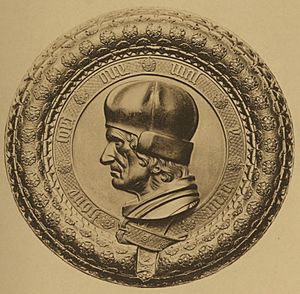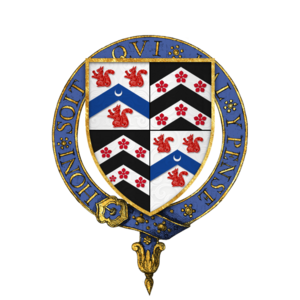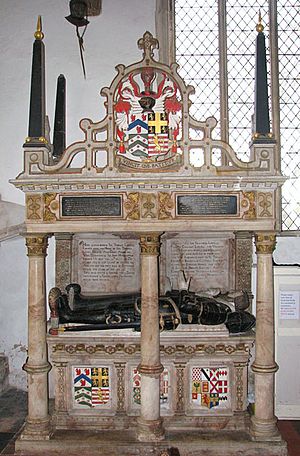Thomas Lovell facts for kids
Quick facts for kids
Sir Thomas Lovell
|
|
|---|---|

Bronze medallion of Sir Thomas Lovell in Henry VII Chapel, Westminster Abbey
|
|
| Chancellor of the Exchequer of England | |
| In office 1485–1524 |
|
| Monarch | Henry VII, Henry VIII |
| Preceded by | William Catesby |
| Succeeded by | The Lord Berners |
| Speaker of the House of Commons | |
| In office 1485–1488 |
|
| Preceded by | William Catesby |
| Succeeded by | Sir John Mordaunt |
| Personal details | |
| Died | 1524 (aged at least 39) |
Sir Thomas Lovell (who died in 1524) was an important English soldier and government official. He held big jobs like Speaker of the House of Commons and Chancellor of the Exchequer. He was also a Knight of the Garter, a special honor.
Contents
Sir Thomas Lovell: A Royal Helper
Early Life and Loyalty
Thomas Lovell was the fifth son of Sir Thomas Lovell from a place called Barton Bendish in Norfolk. His family supported the Lancastrian side in English politics. Thomas Lovell likely studied law at Lincoln's Inn.
He was a strong supporter of Henry Tudor, who later became King Henry VII. Because of this, King Richard III declared him an outlaw. Thomas Lovell returned to England with Henry Tudor and fought bravely at the Battle of Bosworth. After Henry Tudor won and became king, Thomas Lovell was no longer an outlaw.
Working for King Henry VII
After Henry VII became king, Thomas Lovell quickly gained important roles. On October 12, 1485, he became the Chancellor of the Exchequer for life. This job meant he was in charge of the king's money. Soon after, he became a special assistant to King Henry VII. He was also in charge of the money for the King's and Queen's private rooms.
In November 1485, Lovell was chosen to represent Northamptonshire in Parliament. He was then elected as the Speaker of the House of Commons. This meant he led the discussions in the House of Commons. In December 1485, he helped the Commons ask the king to marry Elizabeth of York. He even lent Elizabeth money.
Lovell continued to serve in Parliament for many years. In 1487, he fought alongside King Henry against Lambert Simnel, who pretended to be a prince. Lovell was knighted for his bravery at the Battle of Stoke. In 1489, he became the constable of Nottingham Castle.
Thomas Lovell helped King Henry VII collect money, sometimes in ways that were not very popular. Many agreements for money that were made with Lovell and others were later canceled by King Henry VIII. In 1494, Lovell attended big celebrations for Prince Henry (who would become Henry VIII). In 1500, he traveled with the king to meet a powerful leader near Calais. By 1502, he was in charge of the king's household and led a special council. In 1503, he received the highest honor, becoming a Knight of the Garter. He also helped manage the universities of Oxford and Cambridge.
Serving King Henry VIII
King Henry VIII also trusted and employed Sir Thomas Lovell. He was again made Chancellor of the Exchequer. In 1512, he became the Constable of the Tower of London, a very important position. He also managed the King's wards, who were young people under royal protection.
In 1513, Catherine of Aragon, the queen, asked him to gather soldiers in the Midlands to fight against the Scots. In 1514, he landed in Calais with many men to help in a military campaign.
As Thomas Wolsey became more powerful, Lovell's influence seemed to lessen. An ambassador noted in 1516 that Lovell had stepped back from public life. However, he still hosted important guests, like the Queen-Dowager of Scotland, at his home, Elsyng Palace. In 1520, he traveled to France with other Knights of the Garter to attend the famous meeting between Henry VIII and Francis I of France, known as the Field of the Cloth of Gold.
Sir Thomas Lovell became very ill in May 1523 and died on May 25, 1524, at Elsing Palace. He was buried in a special chapel he had built at Holywell Priory in Shoreditch. His funeral was very grand.
Family and Lasting Impact
Sir Thomas Lovell had several brothers. His eldest brother, Gregory, was also knighted at the Battle of Stoke. Gregory's son, Francis Lovell, later became the adopted son and heir of Sir Thomas Lovell. Another brother, Sir Robert Lovell, was also a knight.
Sir Thomas Lovell married twice. First, he married Eleanor Ratcliffe, and second, he married Isabel, the sister of Edmund de Ros. However, he did not have any children of his own.
Because of the many gifts and grants he received from King Henry VIII, Sir Thomas Lovell died a very wealthy man. He helped pay for buildings at Caius College, Cambridge, and built a gateway for Lincoln's Inn. He also built a large house in Harling, Norfolk. Most of his wealth went to his nephew, Francis. Francis's son, Sir Thomas Lovell (who died in 1567), inherited the estates. Another of Francis's sons, Gregory Lovell, later managed the royal household. Sir Thomas Lovell also worked with Lady Agnes Mellers to help her found what is now Nottingham High School.
 | Percy Lavon Julian |
 | Katherine Johnson |
 | George Washington Carver |
 | Annie Easley |



